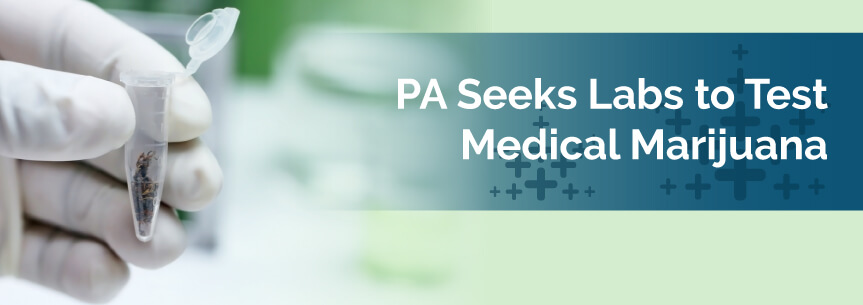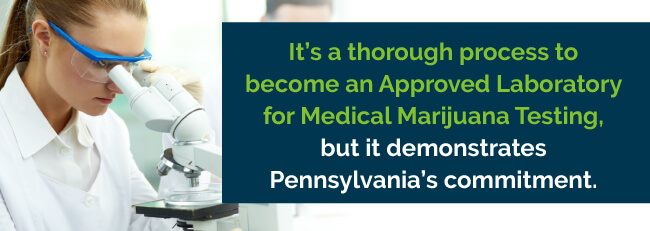
Pennsylvania’s Department of Health continues to push towards its 2018 implementation goal of the state’s Medical Marijuana Program. Already, the state has developed its Medical Marijuana Physician Workgroup, reviewed applications for both growers and dispensaries and accomplished several other key initiatives.
Now, the state’s Department of Health has opened applications for labs interested in testing medical marijuana. Approved labs would collect, examine and grade medical marijuana from the state’s 12 certified growers before the medicine moves on to dispensaries and patients.
Labs designed to test medical pot are like a food and drug inspector. Both parties are entrusted with ensuring a product, whether food or medicine, is safe and works as intended.
Grown outdoors, medical marijuana can carry pesticides or host fungus. Tasked with catching this contamination, before it reaches dispensaries and patients, are Pennsylvania’s future Medical Marijuana Program labs. Labs ensure patients who are already coping with a serious illness gain relief from their medicine.
Medical pot’s efficacy is also tested, making sure users receive a full, effective dosage instead of a partial one that offers limited relief.
The main purpose of medical marijuana labs and their regulation by the state is to ensure the quality and integrity of Pennsylvania’s Medical Marijuana Program and the medicine it provides. Without labs, contaminated medical pot could reach consumers and result in negative reactions, hospitalizations or even deaths.
Either scenario would damage the state program’s credibility and discourage patients who could benefit from medical marijuana from considering it as an option to alleviate their symptoms. Because of these potential risks, the state has developed a thorough application and vetting process for laboratories.
Medical labs with the right equipment and interest in testing medical marijuana are required to submit an application and undergo an investigation by the state. The Pennsylvania Approved Laboratory for Medical Marijuana Testing application consists of 10 sections:
1. General Information
Information about the lab’s in-state location, as well as its medical or pharmacist license, are included in this section.
2. Laboratory Director
Laboratory directors also include their professional, medical or pharmacist license. Approved Pennsylvania labs for medical weed testing are required to have a laboratory director with a certain work and education history, including:
Exceptions to these experiences may be made by Pennsylvania’s Department of Health.
3. Technical Personnel
Technical personnel includes the name, title and professional training of every individual employed at the specific laboratory location that’s applying to become a medical marijuana testing lab.
4. Accreditation Documentation
The state of Pennsylvania provides labs with a certificate of accreditation. Labs without this certificate can apply, but have to submit other documentation, including certificates from accreditations in other jurisdictions and the applicant’s contract with an accreditation organization.
5. Scope of Accreditation Documentation
Candidates must prove their accreditation allows the testing of medical marijuana. Employee competency evaluation processes, to ensure they’re capable of conducting the tests, must also be included in this section.
6. Standard Operating Procedures
Standard operating procedures are meant to demonstrate to the Department of Health that a lab can provide quality and reliable testing. Labs submit their sampling and standard operating procedures for the state’s evaluation.
7. Specialized Laboratory Equipment
Candidates submit a list of their laboratory equipment, including the equipment’s inspection date, serial and model number and its manufacturer.
8. Quality Assurance Program
Quality assurance programs must meet Pennsylvania’s Department of Health’s standards. The state requires a lab’s program to have the following features:
The goal of the program is to ensure medical marijuana is tested and measured without error.
9. Chain of Custody Procedures
Procedures for chain of custody detail the processes and steps when samples are collected from growers or processors, as well as from the Department of Health.
10. Signature
Laboratory owners provide the final touch to the application — their signature.
If a lab is approved, they’ll receive a two-year permit, which they’ll have to renew before its expiration.

It’s a thorough process to become an Approved Laboratory for Medical Marijuana Testing, but it demonstrates Pennsylvania’s commitment to establishing a respectable and trustworthy Medical Marijuana Program for patients and doctors.
Knowing their medicine or prescription marijuana is continually tested and examined for efficacy and safety by an experienced laboratory team is also a source of comfort for patients and doctors.
As one of the latest states to legalize medical marijuana, Pennsylvania’s procedures and steps to start their Medical Marijuana Program indicate the state’s commitment to producing a program that’s reliable, trustworthy and efficient.
The potential success of the program could lead to more patients trying medical marijuana as a natural alternative to other pharmaceutical drugs, as well as these patients receiving relief from their chronic pain. The legalization of non-medical marijuana could also result from the Medical Marijuana Program’s success.
On a larger scale, the legalization of medical marijuana by 23 other states, including Pennsylvania, indicate the growing understanding and acceptance of marijuana by governments as a medicine that helps people find relief from their discomfort.
www.marijuanadoctors.com is a bit of a matchmaker in the medical marijuana field. We help certified and licensed physicians connect with patients, and vice versa, nationwide. We also assist patients and doctors through the process of navigating what is still uncharted territory in finding or prescribing medical marijuana.
To find compassionate medical marijuana doctors in Pennsylvania or other states where medical pot is legal, use our doctor search services or look for approved dispensaries in your area.
No Information on MarijuanaDoctors.Com should be used to diagnose, treat, prevent or cure any disease or condition. You can view our Full Disclaimer here.